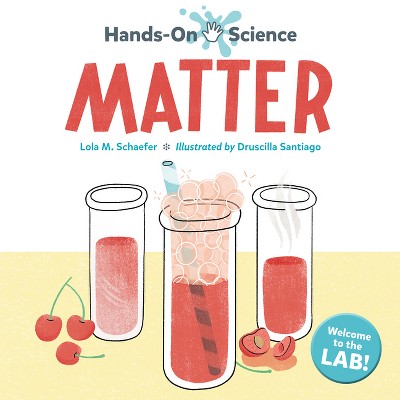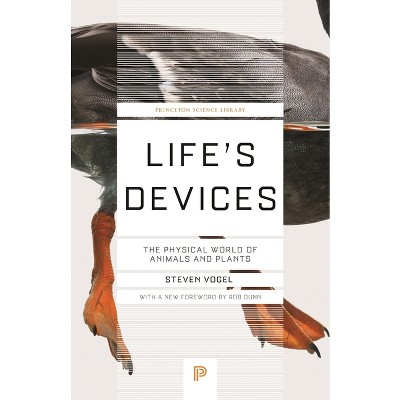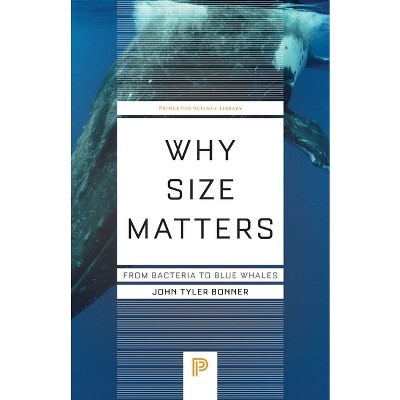Sponsored

Life's Engines - (Princeton Science Library) by Paul G Falkowski (Paperback)
$14.30Save $5.65 (28% off)
In Stock
Eligible for registries and wish lists
Sponsored
About this item
Highlights
- The marvelous microbes that made life on Earth possible and support our very existence For almost four billion years, microbes had the primordial oceans all to themselves.
- About the Author: Paul G. Falkowski holds the Bennett L. Smith Chair in Business and Natural Resources at Rutgers University, where he studies how microbes have shaped the history of Earth.
- 224 Pages
- Science, Life Sciences
- Series Name: Princeton Science Library
Description
Book Synopsis
The marvelous microbes that made life on Earth possible and support our very existence
For almost four billion years, microbes had the primordial oceans all to themselves. The stewards of Earth, these organisms transformed the chemistry of our planet to make it habitable for plants, animals, and us. Life's Engines takes readers deep into the microscopic world to explore how these marvelous creatures made life on Earth possible--and how human life today would cease to exist without them. Paul Falkowski looks "under the hood" of microbes to find the engines of life, the actual working parts that do the biochemical heavy lifting for every living organism on Earth. With insight and humor, he explains how these miniature engines are built--and how they have been appropriated by and assembled like Lego sets within every creature that walks, swims, or flies. Falkowski shows how evolution works to maintain this core machinery of life, and how we and other animals are veritable conglomerations of microbes. A vibrantly entertaining book about the microbes that support our very existence, Life's Engines will inspire wonder about these elegantly complex nanomachines that have driven life since its origin. It also issues a timely warning about the dangers of tinkering with that machinery to make it more "efficient" at meeting the ever-growing demands of humans in the coming century.Review Quotes
"[The] wonderful and awe-inspiring universe of the microbes, unseen creatures that have shaped the planet such that we may live in it, is engagingly presented by Paul Falkowski in a remarkable text entitled Life's Engines. . . . The book's success is its utter simplicity. It tells the story of the history of life on our planet from a very personal perspective. . . . I was so enthralled by this book from the get-go that I invite you to have a short taste of it."---Roberto Kolter, Cell
"A pleasure to read, the book touches on virtually every topic covered in a college biology curriculum by seamlessly weaving concepts with personal anecdotes and analogies. Presenting scientific facts and the fascinating history of their discovery, Falkowski (Rutgers Univ.) intersperses evolutionary theory with biochemistry, ecology, microbiology, molecular biology, anatomy, and even anthropology and economics. He also presents a fact-based, nonpolitical vision for the future of biotechnology. . . . This reviewer came away inspired to learn more. Easily understood by anyone with a passing knowledge of science, this volume poses innumerable questions for further investigation."-- "Choice"
"A work full of surprises. . . . Immensely rewarding."---Tim Flannery, New York Review of Books
"An outstanding attempt to popularize the role of microbes, especially bacteria and archaea, in making multicellular eukaryotic life possible. . . . A superb introduction to the broader consequences of life and its study."---Elof Axel Carlson, Quarterly Review of Biology
"Entertaining, easy-to-read and historically rich."---Adrian Woolfson, Nature
"Falkowski brings a formidable breadth of scientific understanding to the task of explaining this, having worked as a biologist, an oceanographer and an astrobiologist. He moves easily between biological and earth sciences to help us understand the steps microscopic single-celled organisms took to make the planet habitable."-- "Cosmos"
"Falkowski's loving examination sets out, life on this planet is organized by and for bacteria--the rest of us are just along for the ride."---Brian Bethune, Macleans
"Not a microbial biologist, I approached this book with a bit of trepidation, imaging lengthy discussions of biochemistry. Instead, I was immediately engaged by Falkowski's conversational, fluid writing, personal anecdotes, and interesting choice of topics. . . . Life's Engines [is] easily accessible to the lay reader but engaging for the scientist as well."-- "American Biology Teacher"
"Personal stories, hard facts, and illuminative illustrations each contribute to this engaging examination of our microbial overlords . . . Paul Falkowski's decades of study in various earth and life sciences fuel this excellent addition. . . . Falkowski effectively uses analogies to convey abstract and complicated ideas."---Rachel Jagareski, Foreword Reviews
"What is known about the hidden world of the microbes and their fundamental roles in sustaining planetary habitability is insightfully revealed by Paul Falkowski in this authoritative, comprehensive, and delightful book. The author is uniquely qualified, perhaps singularly so, to cover topics ranging over broad time and space scales with a scholarly, transdisciplinary perspective that ranges from fundamental physics and chemistry, to Earth and ocean sciences. I cannot think of any other scientist who would accept such a challenge. . . . He is a gifted scientist and writer, and legendary storyteller."---David M. Karl, Association for the Sciences of Limnology and Oceanography Bulletin
About the Author
Paul G. Falkowski holds the Bennett L. Smith Chair in Business and Natural Resources at Rutgers University, where he studies how microbes have shaped the history of Earth.Dimensions (Overall): 8.43 Inches (H) x 5.35 Inches (W) x .79 Inches (D)
Weight: .4 Pounds
Suggested Age: 22 Years and Up
Series Title: Princeton Science Library
Sub-Genre: Life Sciences
Genre: Science
Number of Pages: 224
Publisher: Princeton University Press
Theme: Microbiology
Format: Paperback
Author: Paul G Falkowski
Language: English
Street Date: June 13, 2023
TCIN: 87845260
UPC: 9780691247687
Item Number (DPCI): 247-21-6061
Origin: Made in the USA or Imported
If the item details aren’t accurate or complete, we want to know about it.
Shipping details
Estimated ship dimensions: 0.79 inches length x 5.35 inches width x 8.43 inches height
Estimated ship weight: 0.4 pounds
We regret that this item cannot be shipped to PO Boxes.
This item cannot be shipped to the following locations: American Samoa (see also separate entry under AS), Guam (see also separate entry under GU), Northern Mariana Islands, Puerto Rico (see also separate entry under PR), United States Minor Outlying Islands, Virgin Islands, U.S., APO/FPO
Return details
This item can be returned to any Target store or Target.com.
This item must be returned within 90 days of the date it was purchased in store, shipped, delivered by a Shipt shopper, or made ready for pickup.
See the return policy for complete information.
Frequently bought together
Trending Non-Fiction

$15.68
Buy 1, get 1 50% off select books
4.8 out of 5 stars with 204 ratings

Highly rated
$19.31
was $20.98 New lower price
Buy 1, get 1 50% off select books
4 out of 5 stars with 67 ratings

$18.28
was $19.58 New lower price
Buy 1, get 1 50% off select books
4.7 out of 5 stars with 17 ratings

$4.59
MSRP $7.99
Buy 1, get 1 50% off select books
4.8 out of 5 stars with 124 ratings

$6.20
MSRP $10.95
Buy 1, get 1 50% off select books
4.8 out of 5 stars with 33 ratings

$7.09
MSRP $9.99
Buy 1, get 1 50% off select books
4.9 out of 5 stars with 46 ratings











